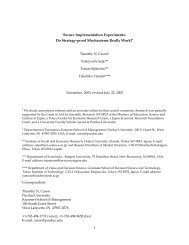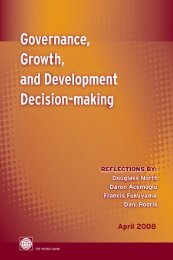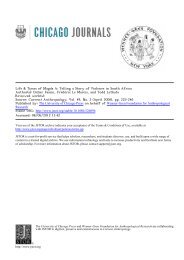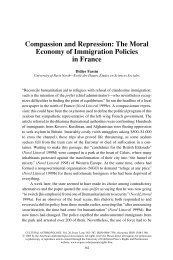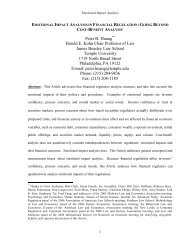The Tools of the Master Slavery and Empire in Nineteenth Century ...
The Tools of the Master Slavery and Empire in Nineteenth Century ...
The Tools of the Master Slavery and Empire in Nineteenth Century ...
You also want an ePaper? Increase the reach of your titles
YUMPU automatically turns print PDFs into web optimized ePapers that Google loves.
4 THE TOOLS OF THE MASTER<br />
which culture, British or Egyptian, was better equipped to control <strong>the</strong> Sudan itself? For <strong>the</strong><br />
Gazette editor, Egyptian society was irrevocably ta<strong>in</strong>ted by Islamic despotism both publicly<br />
<strong>and</strong> privately, a factor which made Egyptians as <strong>in</strong>capable <strong>of</strong> govern<strong>in</strong>g o<strong>the</strong>rs as <strong>the</strong>y were<br />
<strong>of</strong> manag<strong>in</strong>g <strong>the</strong>ir own political <strong>in</strong>dependence:<br />
Surely it would not be safe to entrust persons with so slight a sense <strong>of</strong> moral<br />
<strong>and</strong> political responsibility with more power than <strong>the</strong>y now have. <strong>The</strong>y are<br />
clearly not yet educated up to <strong>the</strong> positions which <strong>the</strong>y hold. <strong>The</strong>se <strong>in</strong>cidents,<br />
though ludicrous at first sight, warn us how unwise it would be to<br />
remove <strong>the</strong> authority which exposes <strong>and</strong> checks practices like <strong>the</strong>se. 10<br />
But <strong>in</strong> <strong>the</strong> view expressed by <strong>the</strong> summary argument that Shawarby Pasha’s lawyer made<br />
before <strong>the</strong> English court, buy<strong>in</strong>g slaves performed a benevolent mission <strong>of</strong> rescue <strong>and</strong> buyers<br />
were civiliz<strong>in</strong>g agents for <strong>the</strong> wretched <strong>of</strong> <strong>the</strong> Sudan:<br />
[. . .]what guilt is <strong>the</strong>re for <strong>the</strong> man who takes <strong>the</strong> kidnaped from misery to<br />
happ<strong>in</strong>ess, from hunger to ease <strong>of</strong> life, replac<strong>in</strong>g <strong>the</strong>ir ragged clo<strong>the</strong>s with<br />
beautiful robes, support<strong>in</strong>g <strong>the</strong>m with money, treat<strong>in</strong>g <strong>the</strong>m with <strong>the</strong> k<strong>in</strong>dness<br />
that both his religion <strong>and</strong> his sense <strong>of</strong> humanity dictate to him. He<br />
does not buy <strong>the</strong>m for trade, or for pr<strong>of</strong>it. 11<br />
<strong>The</strong> slave trial ended without resolv<strong>in</strong>g any <strong>of</strong> <strong>the</strong>se questions. One pasha who had<br />
actually confessed to buy<strong>in</strong>g one <strong>of</strong> <strong>the</strong> slaves was convicted. <strong>The</strong> bedou<strong>in</strong> traders were also<br />
found guilty, <strong>and</strong> sentenced to five years’ hard labor. <strong>The</strong> court acquitted <strong>the</strong> o<strong>the</strong>r pashas<br />
<strong>of</strong> all charges, a verdict which <strong>the</strong> majority <strong>of</strong> Egyptian newspapers heralded as a national<br />
victory. Not all <strong>of</strong> <strong>the</strong> slaves had been as clear as Zanouba about <strong>the</strong> identity <strong>of</strong> <strong>the</strong>ir former<br />
buyers, <strong>and</strong> one had not recognized Shawarby Pasha at all <strong>in</strong> court. This weakened <strong>the</strong> prosecution’s<br />
charges aga<strong>in</strong>st him. <strong>The</strong> Khedive ordered Ali Pasha Sherif to resign from his position<br />
as president <strong>of</strong> <strong>the</strong> Legislative Council, <strong>and</strong> it was widely believed that he had lost all<br />
popular support. Certa<strong>in</strong>ly his image was sharply tarnished <strong>in</strong> <strong>the</strong> Egyptian nationalist press<br />
when he claimed citizenship <strong>in</strong> ano<strong>the</strong>r—a European—country (an appeal denied by <strong>the</strong><br />
Italian government). After mak<strong>in</strong>g a confession, he was soon acquitted on <strong>the</strong> grounds <strong>of</strong><br />
his age <strong>and</strong> his poor health. 12<br />
He died <strong>of</strong> a heart attack two years later. Zanouba <strong>and</strong> <strong>the</strong><br />
o<strong>the</strong>r five women walked out <strong>of</strong> <strong>the</strong> courtroom free. <strong>The</strong> Slave Trade Bureau gave <strong>the</strong>m<br />
<strong>the</strong>ir manumission papers, <strong>and</strong> <strong>the</strong>y rejo<strong>in</strong>ed each o<strong>the</strong>r for a time <strong>in</strong> <strong>the</strong> Cairo Home for<br />
Freed Women Slaves, where <strong>the</strong>ir stay was subsidized by <strong>the</strong> British <strong>and</strong> Foreign Anti-<br />
<strong>Slavery</strong> Society. 13 When <strong>the</strong>y left <strong>the</strong> Home, ei<strong>the</strong>r for employment as domestics or for<br />
marriage, <strong>the</strong>y walked out <strong>in</strong>to historical oblivion. <strong>The</strong> Legislative Assembly made no more<br />
appeals to close <strong>the</strong> Slave Trade Bureau.<br />
For several weeks, however, <strong>the</strong>se six women had appeared like mirrors before <strong>the</strong><br />
Egyptian <strong>and</strong> British public, reflect<strong>in</strong>g how deeply both cultures had <strong>in</strong>vested <strong>in</strong> <strong>the</strong> image<br />
<strong>of</strong> <strong>the</strong> civiliz<strong>in</strong>g savior <strong>of</strong> African peoples. <strong>The</strong> figures <strong>of</strong> <strong>the</strong>se women also reflected o<strong>the</strong>r<br />
fears: British anxieties about black women as agents <strong>of</strong> sexual licentiousness <strong>and</strong> crime;<br />
Egyptian fears <strong>of</strong> be<strong>in</strong>g identified with <strong>the</strong>se women as uncivilized <strong>and</strong> so <strong>of</strong> be<strong>in</strong>g made<br />
slaves to <strong>the</strong> British. <strong>The</strong>se apprehensions became clear <strong>in</strong> <strong>the</strong> representation <strong>of</strong> <strong>the</strong> slave<br />
women <strong>in</strong> both newspaper <strong>and</strong> <strong>of</strong>ficial accounts <strong>of</strong> <strong>the</strong> trial; <strong>the</strong> verdict left <strong>the</strong> question <strong>of</strong><br />
<strong>the</strong> actual ownership <strong>of</strong> <strong>the</strong>se women—<strong>and</strong> <strong>of</strong> <strong>the</strong> Sudan—wide open. <strong>The</strong> perimeters <strong>of</strong><br />
Egyptian geography, its form <strong>and</strong> its limits, <strong>the</strong> full extent <strong>of</strong> <strong>the</strong> body politic, were still to be<br />
mapped.<br />
<strong>The</strong> trial took only ten days. Follow<strong>in</strong>g Lord Cromer’s recommendations, Frith Bey <strong>and</strong>



